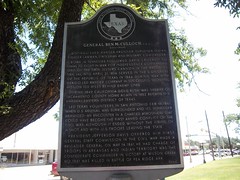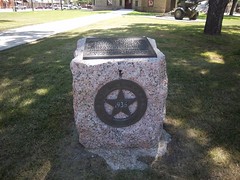General Ben McCulloch


General Ben McCulloch
(1811-1862)
Confederate States Army Brigadier General, Texas Ranger, Indian fighter, statesman, military commander, frontier surveyor, and lawman
Family tree
Commemorated on 6 plaques
Texas Historical Marker #02125
General Ben McCulloch, C.S.A. (1811-1862). Distinguished Ranger, frontier surveyor, Indian fighter, lawman, statesman and military commander. Born in Tennessee. Followed David Crockett to Texas to fight in War for Independence. Commanded one of the "Twin Sisters" cannon in the Battle of San Jacinto, April 21, 1836. Served in the Congress of the Republic of Texas. In 1846, during war with Mexico, led Ranger company in successful scouting mission 100 miles behind enemy lines. During 1849 California gold rush was sheriff of Sacramento County. Home again in 1852 became U.S. Marshal, Eastern District of Texas. Led Texas volunteers in San Antonio Feb. 16, 1861, when U.S. arsenal was surrounded and its surrender demanded--an encounter in a charged atmosphere that could have become the first armed conflict of the Civil War, although it ended without the firing of a shot, and with U.S. troops leaving the state. President Jefferson Davis offered him first General Staff Commission in the Civil War. Made a Brigadier General on May 14, 1861, he had charge of troops in Arkansas and Indian territory. Was the Confederate Commander in victory at Wilson Creek, Mo., 1861. Was killed in Battle of Pea Ridge, Ark. (1964) #2125
?, Brady, TX, United States where they lived near
Texas Historical Marker #02374
Hardscramble. Home of Henry and Ben McCulloch, 1841-1853; of Nathaniel Benton, 1858; of Elijah V. Dale, 1871; famous Texas Rangers and veterans all of the Texas Revolution; bravery, skill and courage, were common attributes of men who dared the wilderness of Texas, but no patriots of Texas ever offered greater service than did the McCullochs, Benton and Dale. #2374
?, Seguin, TX, United States where they lived (1840-1853)
Texas Historical Marker #03128
Los Nogales. This structure was built in 1849 for German immigrant Justus Gombert. The one-room adobe structure, later stuccoed and enlarged, was owned from 1849 to 1859 by Joseph Zorn. After the Civil War, the property was used as a campground for members of the Freemen's Bureau. Ben McCulloch owned the property briefly in 1870. Demolition of the house was prevented as the first project of the Seguin Conservation Society in 1952. Los Nogales (Spanish for walnuts), as it is now known, was designated a Recorded Texas Historic Landmark in 1962. (1989) #3128
415 S River St, Seguin, TX, United States where they lived (1870)
Texas Historical Marker #03285
McCulloch County. Created Aug. 27, 1856. One of 128 counties formed from Bexar County that extended from the Rio Grande to the Panhandle, and as far west as El Paso. Named for Texas hero, Ben McCulloch, who fought in Texas Revolution, Indian, Mexican and Civil Wars. Indian and frontier hazards made growth slow and 20 years passed before buffalo were hunted off and ranches established. Organized Aug. 4, 1876 with Brady, county seat. Became ranch, farm, recreation center. Site of geographical center of Texas and 1831 Calf Creek Battle, where James Bowie, Alamo hero, defeated 100 Indians. #3285
?, Brady, TX, United States where they is commemorated
Texas Historical Marker #05579
Surrender of Federal Forces by General David E. Twiggs. Brought about a Texas moved to expel 2600 federal troops- a step necessary after secession. Frontier fighter Ben McCulloch with 400 volunteers forced surrender negotiated at headquarters of Gen. Twiggs a block and a half from here, by 4 representatives of the Texas Committee on public safety. Talks began Feb. 8, 1861; were stalled by Feb. 15. That night 90 of Mcculloch's men stole in, fixed guns on Federal Sentries and Garrison in Alamo Plaza. 300 more Texas troops entered the city. The 160 men of Twiggs' force were disarmed and held in Quarters. On Feb. 16, Gen. Twiggs agreed to evacuate his troops with arms and personal gear. Further pressure was used and one Feb. 18 he surrendered over $3,000,000 worth of Federal Property: Ordnance, wagons, mules horses, supplies, money and a chain of forts. Gen. Twigs, native of Georgia, career soldier, veteran of war of 1812 and Mexican war, was 70 and in poor health. He held sacred his oath as an officer. Since Dec. 27, 1860, he had written 4 times to his superior in Washington, general of the army Winfield Scott, for orders to use in event Texas seceded. He had no reply. Nevertheless, surrender brought him dismissal for treachery-and personal heartbreak. #5579
?, San Antonio, TX, United States where they forced a surrender (1861)
Texas Historical Marker #10248
Camp Ben McCulloch No. 946, United Confederate Veterans. Hays County Confederate veterans and their families gathered for a reunion in the summer of 1896 and formally organized the Camp Ben McCulloch Chapter of the United Confederate Veterans. The gathering took place near this site at the Martin Spring and campsite on Onion Creek. The reunion grounds were purchased by the organization in 1904 and have continued as the site of the annual reunion with the exception of one year during World War I. The first commander of Camp Ben McCulloch was Capt. Martin Luther Reed. Other officers elected at the first meeting were Jacob C. Quick, W. M. Weaver, W. W. Davis, W. T. Chapman, Dr. J. M. Pound, and Santa Anna Cruze. The camp was named for Confederate General Ben McCulloch, also a veteran of the Texas Revolution, who died in the Battle of Pea Ridge, Arkansas, in 1862. The reunion grounds and other responsibilities were transferred to the care of the Confederate Sons after Burl Nash, the last veteran in the county died in 1947 at age 108. The Sons in turn deeded the camp to the grandsons and other descendants of the Confederate veterans. Reunions continue to be held, illustrating the ongoing impact of the Civil War on Texas history. Texas Sesquicentennial 1836 - 1986 #10248
?, Driftwood, TX, United States where they is commemorated




